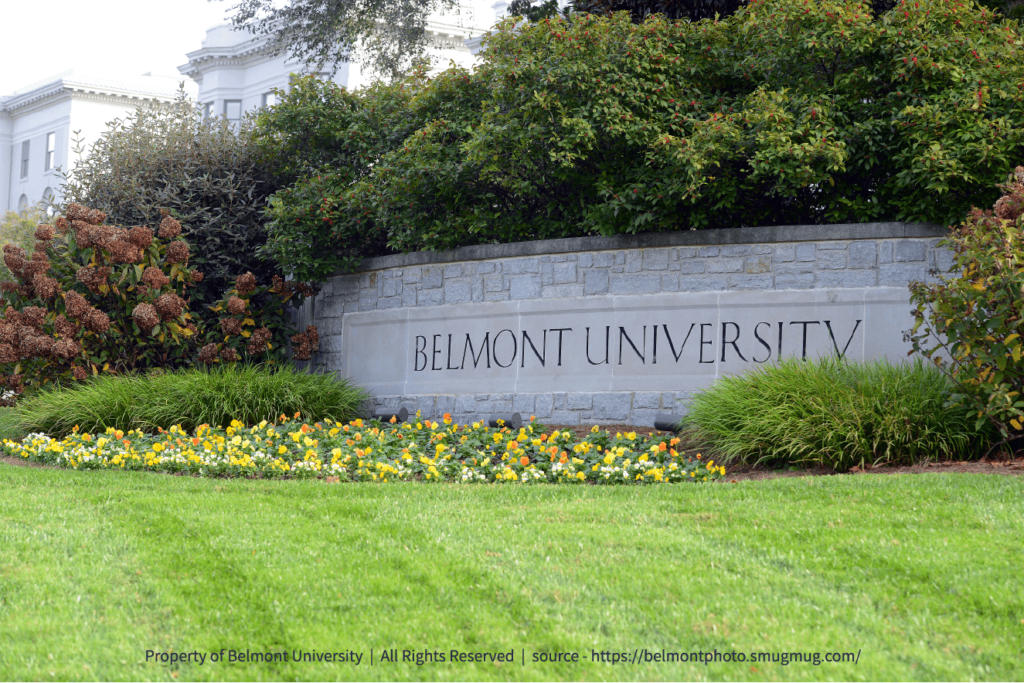
Belmont University’s entrepreneur program gives aspiring entrepreneurs a well-rounded education that incorporates business models, ethics, growth management, and helps recognize and evaluate potential opportunities.
This series has a specific goal: to give the next generation of up and coming entrepreneurs some insight on potential educational opportunities. For more a list of more university programs, check out our University Entrepreneur Program Spotlight.
Belmont University
Located near downtown Nashville, Tennessee, Belmont’s entrepreneur program aims to give aspiring business minded people a well-rounded education in order to turn them into the next leading innovators and entrepreneurs. With an average of 1,000 students in the program, they specifically designed their courses to help uplift, educate, mentor, and excel the incoming students that have an interest in entrepreneurship. In order to do this, they incorporate business models, ethics, growth management, and cultivate an eye to recognize potential opportunities and when to take them.
The entrepreneurship program is available to both undergraduate and graduate students with over 26 entrepreneurship-related courses. Undergraduate students working towards a degree in Business Administration (BBA) can take on a concentration in entrepreneurship. To obtain this degree, undergraduates must take 18 credit hours of Business Tool courses, 22 hours of Business Core courses, and 18 hours of Entrepreneurship along with their required general education courses. Graduate students from the Jack C. Massey Graduate School of Business can broaden their business education by taking graduate level entrepreneurship courses. Regardless of the degree pursued, by the end of the program all students are ready to be confident, successful entrepreneurs.
The Center for Entrepreneurship
An extension of the Jack C. Massey College of Business Administration, the center was established in 2003 and prides itself on being an all-inclusive program for all entrepreneurially-minded students regardless of their interest or university path. Named one of the Top 25 Undergraduate Entrepreneurship Programs in the nation by The Princeton Review for six years in a row (2011-2016), Belmont is an institution with robust resources, mentors, and electives to offer to the next generation of innovators and initiators. Dedicated to an interactive, hands-on education, students are provided with a retail space to start formulating and running their own small-scale business. This is the sort of environment that allows students to explore their creativity and to form their ideas into potential long-term ventures.
One of these outlets, known as The Accelerator, is a space where students are advised by local entrepreneurs from the Belmont Entrepreneur Network. Members of this program have first access to clinics, workshops, and mentors, and attend monthly meetings with all businesses within the program. This type of advisement is critical in guiding students through the first steps of establishing a business. Members are also eligible to receive the Excellence in Entrepreneurship Grant, which are funds designated to assist in supporting new and developing businesses. This type of structure turns everyday students into fully established entrepreneurs upon graduation.
Faculty & Staff
Belmont only staffs their faculty with successful entrepreneurs that have founded, managed or assisted in the development of a successful business venture. For example, Dr. Jeff Cornwall (who is the Chair of Business Administration) is a seasoned instructor with over twenty years of experience in developing and managing companies. He has previously worked with Atlantic Behavioral Health Systems which is responsible for the operation of outpatient clinics and residential facilities across North Carolina. Dr. Cornwall is a published author and co-writer in various books and journals such as Entrepreneurship Theory and Practice. What sets apart Belmont’s staff from other institutions? He states that the faculty members “believe experiential learning is the key to understanding how to start, and build, and grow a business.”
He highlights the qualities of entrepreneurship majors and the program in this video.
Entrepreneurs in Residence (EIR)
The university also has two EIR’s that are available to mentor and instruct students one on one. This program is especially beneficial because it gives students the opportunity to be coached by an experienced professional in a personal, concentrated setting. Shawn Glinter is one of the two EIR’s at the university known for being a startup operator. Before taking the EIR position at Belmont, Mr. Glinter spent six years as a Master Mentor at the Nashville Entrepreneurs Center. He also currently mentors at the Life Science Mentor Program and the JumpStart Foundry.
The entrepreneurship program may be robust, but Belmont doesn’t stop there. They support a vast range of organizations and activities within the College of Business that are available to students of varying majors.
A few of the different Activities & Clubs the University has to offer:
-
E-Club (Entrepreneurship Club)
This club hosts events that bring a variety of entrepreneurs and guest speakers to Belmont’s campus. The speakers help educate students about the challenges faced in becoming a successful entrepreneur. Even more importantly, these events bring valuable opportunities for the students to network with established professionals in their field.
-
Collegiate DECA
This is an international organization with a mission to help students interested in any form of business as a career. Collegiate DECA provides opportunities to compete with their peers and to showcase their own strengths and skills in areas like marketing, management, and entrepreneurship.
-
Enactus (formerly known as “Students in Free Enterprise”)
Another international non-profit organization that encourages students and their academic or business leaders to work together. Enactus is dedicated to improving the quality of life and standard living for people in need through entrepreneurial action.
-
Sigma Nu Tau
An honors society specifically for students studying entrepreneurship. The purpose of this organization is to recognize, promote, and reward academic excellence in entrepreneurship. Students must have a Junior or Senior status, be an entrepreneurship major, and maintain a cumulative GPA of 3.0 or higher.
-
The Belmont Business Plan Competition
There are also competitive opportunities such as The Belmont Business Plan Competition, where undergraduate students can meet investors while showcasing their business proposals. Baker, Donelson, Bearman, Caldwell & Berkowitz, PC, a prestigious law firm established in 1888 sponsors this competition. Winner of first place in this competition receives a check for $5,000, along with the title of “Outstanding Student Entrepreneurship of the Year”. Second and third place winners also receive checks in the amounts of $2,000 and $1,000. Previous winners include 2014 – Channing Moreland, Makenzie Stokel, Seth Clarke (What’s Hubbin), 2013 – Ross Hill (PictureBooth.Co), 2012 – Jerell Harris (QuickMed).
Alumni Successes
As stated earlier, students don’t just leave Belmont with a degree, they may exit the program with fully functional businesses. As of 2017, 122 businesses have been launched over the course of 10 years with funding amounting to over $2,000,000! Here are a few alumni that have turned their concepts into successful ventures.
- Miss Lucille’s Marketplace – Founded by Luci Knott Armitstead
- Home Sweet Home Co. – Founded by Brock Fuller
- Aloompa – Founded by Kurt Nelson & Tyler Seymour
- Golden Spiral Marketing – Founded by Peter Smith
Belmont University continues to grow with an average student body count of around 8,000 individuals. The cost of tuition as of 2018-2019 is $34,310 without room and board. However, there are several accessible financial aid resources such as scholarships, work-study, grants, merit-based aid, competitions, and student loans available.
These types of opportunities are only the tip of the iceberg. Belmont University is an establishment that prides itself on providing beneficial and lasting networking opportunities. They are educating students in a way that lets them get their hands dirty—more than just slideshows, notes, and exams. These students get to dive right into their craft, to take the big ideas buzzing around in their heads and build something out of it.
Source: Belmont.edu









